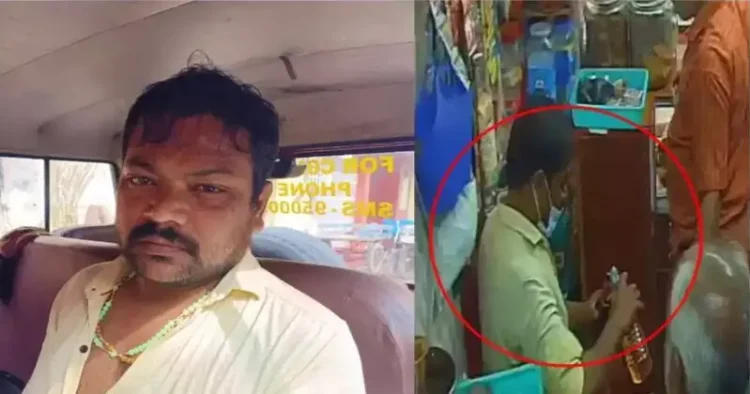According to the police, Muralikrishnan, a 39-year-old local resident known for his involvement in previous criminal activities, arrived at the temple around 8:40 am and tossed the petrol bomb towards the sanctum sanctorum. Devotees, alarmed by the commotion, fled the scene. However, the culprit’s attempt to escape was thwarted as he was apprehended by a combination of alert citizens and law enforcement officers.
Law enforcement officials revealed that Muralikrishnan, a regular visitor to the temple, was intoxicated at the time of the incident. They also highlighted his frustration stemming from the struggling business of his wholesale dry fruits shop adjacent to the Veerabhadra Swamy Temple. Allegedly, Muralikrishnan resorted to this violent act after facing personal and professional misfortunes, with prayers seemingly yielding negative results.
CCTV footage obtained from a nearby tea shop captured Muralikrishnan preparing the Molotov cocktail. He was observed filling a glass bottle with petrol, sealing it with a lid, and wrapping it in cloth before igniting it. Authorities noted that Muralikrishnan had a history of criminal charges, including attempts to murder and assault.
Following the incident, a judge from the Madras High Court conducted an inquiry at the temple site. The state president of the Bharatiya Janata Party (BJP), Annamalai, criticised the law and order situation in Tamil Nadu, linking the incident to the failure of the ruling DMK party to control separatist organisations. He cited previous attacks on the BJP office and the Governor’s Raj Bhavan, claiming a pattern of deteriorating security.
A curious twist emerged as journalist Ganesan questioned Muralikrishnan’s motives, pointing out a photograph taken before his arrest, which showed him wearing a rosary with a cross. Ganesan pondered why, if Muralikrishnan’s prayers were unanswered, he targeted a Hindu temple instead of a church.
This incident follows a recent car bomb blast in Coimbatore, initially attributed to an LPG cylinder explosion by the DMK government and police. Subsequently, the National Investigation Agency (NIA) took over the investigation, revealing it as a lone wolf terrorist attack. AIADMK general secretary Edapaddi K Palaniswami expressed widespread fear and anger among the people, asserting that the “bomb culture” has expanded from the Governor’s residence to temples in Tamil Nadu.
In a related arrest, history-sheeter Karukka Vinodh, 39, was apprehended two weeks ago for hurling a petrol bomb outside Raj Bhavan. Vinodh, known for his involvement in multiple petrol bomb incidents, has been detained under the Goondas Act.
The spate of attacks has raised concerns about the effectiveness of law enforcement in preventing such incidents and addressing the root causes behind individuals resorting to violence. The broader implications of these events on the social and political landscape of Tamil Nadu remain a subject of ongoing discussion and investigation.



















Comments